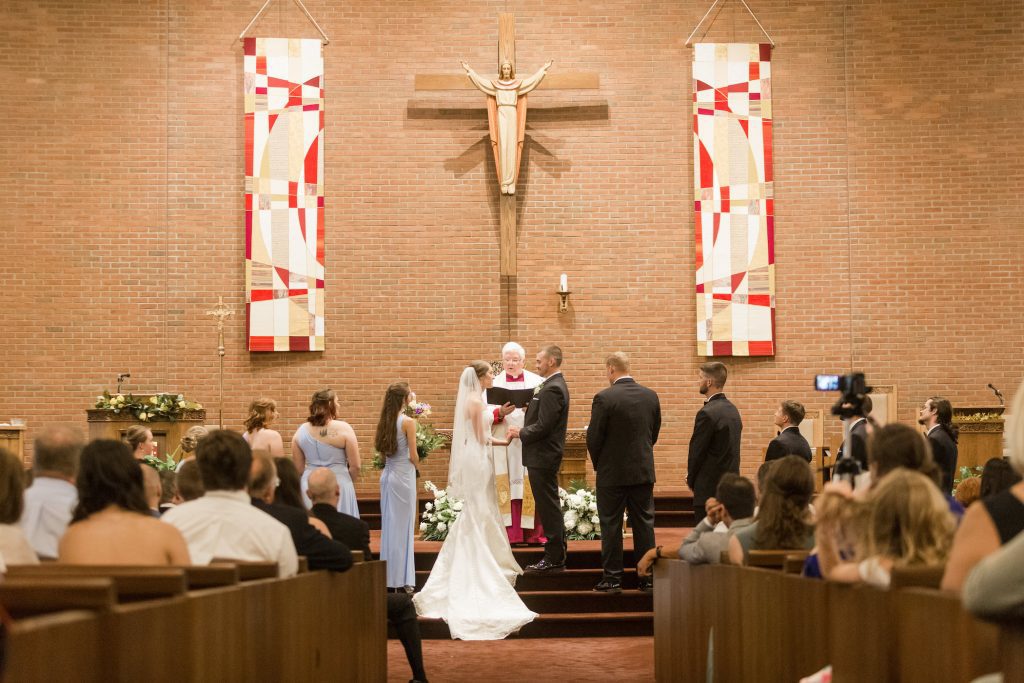“St. Paul said: ‘Husbands, love your wives, as Christ loves the Church….This is a great mystery, and I mean in reference to Christ and the Church.’ (Eph. 5: 25, 32)
Sacred Scripture begins with the creation and union of man and woman and ends with “the wedding feast of the Lamb” (Rev 19:7, 9). Scripture often refers to marriage, its origin and purpose, the meaning God gave to it, and its renewal in the covenant made by Jesus with his Church. Man and woman were created for each other.
By their marriage, the couple witnesses Christ’s spousal love for the Church. One of the Nuptial Blessings in the liturgical celebration of marriage refers to this in saying, “Father, you have made the union of man and wife so holy a mystery that it symbolizes the marriage of Christ and his Church.”

The Sacrament of Marriage is a covenant, which is more than a contract. Covenant always expresses a relationship between persons. The marriage covenant refers to the relationship between the husband and wife, a permanent union of persons capable of knowing and loving each other and God. The celebration of marriage is also a liturgical act, appropriately held in a public liturgy at church. Catholics are urged to celebrate their marriage within the Eucharistic Liturgy. The Sacrament of Matrimony unites a Christian man and woman in marriage for life, thus bringing them closer to the Lord and to each other. This Sacrament also gives the couple the help that they need to live in oneness and love.
“The Sacrament of Matrimony signifies the union of Christ and his Church. It gives spouses the grace to love each other with the love with which Christ has loved his Church; the grace of the sacrament thus perfects the human love of the spouses, strengthens their indissoluble unity, and sanctifies them on the way to eternal life.” (Catechism of the Catholic Church # 1161.)
Diocesan Common Policy
Diocesan Common Policy requires nine to twelve months advance notification to the parish and the completion of marriage preparation as established by the Diocese of Harrisburg. A couple will meet with a priest or deacon at least four times and attend either an Engaged Encounter Weekend or the Marriage Mentoring Program. The Engaged Encounter is a weekend away with other engaged couples. The weekend is designed to give a couple who is planning marriage the opportunity to communicate – individually, honestly, and intensively – about their prospective lives together.
The Marriage Mentoring Program is marriage preparation, in which the engaged couple meets with a married mentor couple for a total of five sessions. The first two sessions consist of the administration and discussion of FOCCUS (Facilitating Open Couple Communication, Understanding, & Study). The next three meetings will be a workshop process on a variety of topics related to marriage.
God’s Plan for Love
In addition to meeting with a married couple, the engaged couple is to attend a day-long presentation entitled God’s Plan for Love, usually on a Saturday from 9:00 a.m. to 4:00 p.m. at designated diocesan locations.
As a complement to the mentor couples program, God’s Plan for Love is a single-day program that explores the Church’s teachings on: marriage as a sacrament and a vocation; the human person and God’s design for marriage; and human sexuality.
The diocese offers many God’s Plan conferences throughout the year and in a variety of diocesan locations, although you should only sign up for a conference after your initial meeting at the parish.
Below is an informational brochure explaining God’s Plan for Love and here is the link for couples to register.
Ordinarily, one of the individuals entering marriage needs to be a registered member of the parish. Weddings are scheduled on a first come, first served basis at a time not later than 2:00 p.m. on a Saturday. Saint Columba Parish has approximately ten weddings a year, thus it is important to schedule a date and time as early as possible.
There is a possibility that a Catholic may marry validly in a Protestant Church before a Protestant minister; however, permission to be granted by the Bishop’s Office and the required marriage preparation needs to be completed through the Catholic Church. This is normally granted, especially if the bride is the Protestant and is active in her particular denomination.
If the marriage is of a mixed religion, the Catholic party must promise sincerely: “I reaffirm my faith in Jesus Christ and, with God’s help, intend to continue living that faith in the Catholic Church. I promise to do all within my power to share the faith I have received with our children by having them baptized and reared as Catholics.” The other party needs not sign anything, but needs to be aware that the Catholic has made this promise.
Two Catholics confer the Sacrament of Matrimony on each other usually during the celebration of the Eucharist. When there is a marriage of mixed religions, normally the marriage is celebrated apart from Mass because of the non-Catholic being unable to receive Holy Communion. The unity of the couple is important on their wedding day. There is the sign of unity in the Liturgy of the Word as it is celebrated with other Christian denominations.


